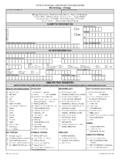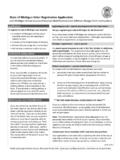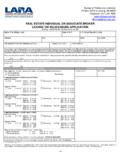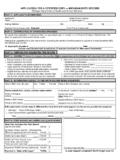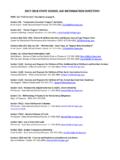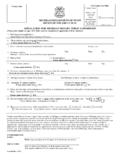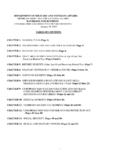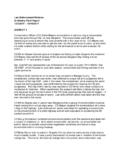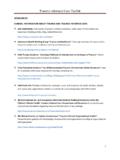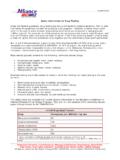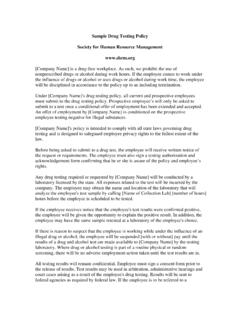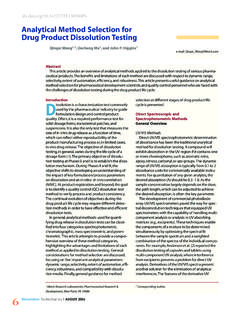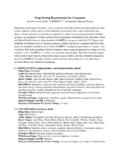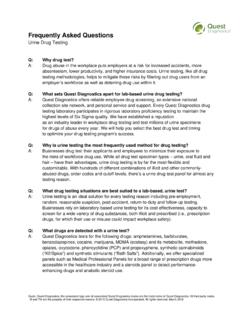Transcription of ARTICLE 23 DRUG AND ALCOHOL TESTING Section …
1 ARTICLE 23 drug AND ALCOHOL TESTING Section A. Definitions. As used in this ARTICLE : 1. ALCOHOL test means a chemical or breath test administered for the purpose of determining the presence or absence of ALCOHOL in a person s body. 2. drug means a controlled substance or a controlled substance analogue listed in schedule 1 or schedule 2 of part 72 of the Michigan public health code, Act No. 368 of the Public Acts of 1978, being sections , et seq., of the Michigan Compiled Laws, as may be amended from time to time. 3. drug test means a chemical test administered for the purpose of determining the presence or absence of a drug or metabolites in a person s bodily fluids. 4. Random selection basis means a mechanism for selecting test-designated employees for drug tests and ALCOHOL tests that (1) results in an equal probability that any employee from a group of employees subject to the selection mechanism will be selected and (2) does not give the Employer discretion to waive or mandate the selection of any employee selected under the mechanism.
2 5. Reasonable suspicion means a belief, drawn from specific objective facts and reasonable inferences drawn from those facts in light of experience, that an employee is using or may have used drugs or ALCOHOL in violation of a departmental work rule or a civil service rule or regulation. By way of example only, reasonable suspicion may be based upon any of the following: a. Observable phenomena, such as direct observation of drug or ALCOHOL use or the physical symptoms or manifestations of being impaired by, or under the influence of, a drug or ALCOHOL . b. A report of on-duty or sufficiently recent off-duty drug or ALCOHOL use provided by a credible source. c. Evidence that an individual has tampered with a drug test or ALCOHOL test during employment with the State of Michigan.
3 D. Evidence that an employee is involved in the use, possession, sale, solicitation, or transfer of drugs or ALCOHOL while on duty, while on the Employer s premises, or while operating the Employer s vehicle, machinery, or equipment. 6. Rehabilitation program means an established program to identify, assess, treat, and resolve employee drug or ALCOHOL abuse. 7. Test-designated employee means an employee who occupies a test-designated position. 8. Test-designated position means any of the following: a. A safety-sensitive position in which the incumbent is required to possess a valid commercial driver s license or to operate a commercial motor vehicle, an emergency vehicle, or dangerous equipment or machinery.
4 B. A position in which the incumbent possesses law enforcement powers or is required or permitted to carry a firearm while on duty. c. A position in which the incumbent, on a regular basis, provides direct health care services to persons in the care or custody of the state or one of its political subdivisions. d. A position in which the incumbent has regular unsupervised access to and direct contact with prisoners, probationers, or parolees. e. A position in which the incumbent has unsupervised access to controlled substances. f. A position in which the incumbent is responsible for handling or using hazardous or explosive materials. Section B. Prohibited Activities. An employee shall not do any of the following: 1.
5 Consume ALCOHOL while on duty. 2. Consume drugs while on duty, except pursuant to a lawful prescription issued to the employee. 3. Report to duty or be on duty with a prohibited level of ALCOHOL or drugs present in the employee s bodily fluids. 4. Refuse to submit to a required drug test or ALCOHOL test. 5. Interfere with any TESTING procedure or tamper with any test sample. Section C. TESTING . The Employer may require an employee, as a condition of continued employment, to submit to a drug test or an ALCOHOL test, as provided in this ARTICLE . An employee may refuse to submit to a drug screening or ALCOHOL test but the employee shall be warned that such refusal constitutes grounds for discipline equivalent to discipline imposed for a positive test result, and allowed an opportunity to submit to the TESTING as though the employee had originally complied with the order.
6 1. Random Selection TESTING : A test-designated employee shall submit to a drug test and an ALCOHOL test if the employee has been selected for TESTING on a random selection basis. 2. Reasonable Suspicion TESTING : An employee shall be required to submit to a drug test or an ALCOHOL test if there is reasonable suspicion that the employee has violated this ARTICLE or a departmental work rule. 3. Preappointment TESTING : An employee not occupying a test-designated position shall submit to a drug test if the employee is selected for a test-designated position. 4. Follow-up TESTING : An employee shall submit to an unscheduled follow-up drug test or ALCOHOL test if, within the previous 24-month period, the employee voluntarily disclosed drug or ALCOHOL problems, entered into or completed a rehabilitation program for drug or ALCOHOL abuse, failed or refused a preappointment drug test, or was disciplined for violating this ARTICLE or a departmental work rule.
7 5. Post-incident TESTING : A test-designated employee shall submit to a drug test or an ALCOHOL test if there is evidence that the test-designated employee may have caused or contributed to an on-duty accident or incident resulting in death, or serious personal injury requiring immediate medical treatment, that arises out of any of the following: a. The operation of a motor vehicle. b. The discharge of a firearm. c. A physical altercation. d. The provision of direct health care services. e. The handling of dangerous or hazardous materials. Section D. Limitations on Certain Tests. 1. Test selection. An employee subject to TESTING under this rule may be required to submit only to a drug test, only to an ALCOHOL test, or to both tests.
8 However, preappointment TESTING shall be limited to drug TESTING . An employee selected for random drug and/or ALCOHOL TESTING shall be directed to report to the collection site no later than the end of the first shift after the agency representative has received notice of that employee's selection. The employee must be on duty and the collection site must be able to provide the test. 2. Limitations on follow-up TESTING . The Employer may require an employee who is subject to follow-up TESTING to submit to no more than six unscheduled drug or ALCOHOL tests within any twelve-month period. 3. Limitations on random selection TESTING . The number of drug tests conducted in any one year on a random selection basis shall not exceed fifteen percent (15%) of the number of all test-designated positions.
9 The number of ALCOHOL tests conducted in any one year on a random selection basis shall not exceed fifteen percent (15%) of the number of all test-designated positions. 4. Limitations on reasonable suspicion TESTING . Before an employee is subject to reasonable suspicion TESTING , a trained supervisor must document the basis for the reasonable suspicion. In addition, an employee shall not be subject to a reasonable suspicion test until the Employer-designated drug and ALCOHOL TESTING coordinator (DATC), or the DATC s designee, has given express, individualized approval to conduct the test. Section E. drug and ALCOHOL TESTING Protocols. 1. drug TESTING protocol. The employer will adopt the current Mandatory Guidelines for Federal Workplace drug TESTING Programs, as amended, issued by the Department of Health and Human Services (the HHS drug Guidelines ) as the protocol for drug TESTING under this ARTICLE .
10 2. ALCOHOL TESTING protocol. The Employer will adopt the ALCOHOL TESTING provisions of the current Procedures for Transportation Workplace drug and ALCOHOL TESTING Programs, as amended, issued by the Department of Transportation (the DOT ALCOHOL Guidelines ) as the protocol for ALCOHOL TESTING under this ARTICLE . 3. Changes in protocol. During the term of this agreement, the parties may agree to amend the protocols without the further approval of the Civil Service Commission to include any final changes to the HHS drug Guidelines or the DOT ALCOHOL Guidelines that are published in the Federal Register and become effective. If the parties agree to adopt any such final changes, the parties shall notify the State Personnel Director in writing of the changes and their effective date.
